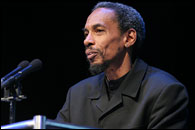Editorial dialogue-2007 Edition-

Provocative pronouncements recently suggesting modern day human trafficking is worst than Chattel Slavery is but a confirmation of culpability. In fact such insensitive conjecture, (without an apology for this transgression) further compounds complicity for a flagrant abuse of human rights. It is also a direct assault/insult on the integrity of surviving generations across the Afrikan Diaspora.
The world, as we know it today is still reeling from the effects of that human calamity. While many remain unaware that painstaking research- has revealed this so called ”Gentleman’s Trade” was not abolished because perpetrators felt remorse for their victims (of whatever hue or origin) but conveniently abandoned some conduits of this heinous system because of economic expediency.
As indicated in our previous issue, this auspicious anniversary offers all an opportunity to debate, RE-visit and RE-examine the factors that contributed to this sad saga that haunts the present. It is necessary to redress the balance acknowledging the diverse struggles against this grave injustice.
Abolition as legislated (two hundred years ago) resonates hollow as the fate of those who were rescued by British ships were immediately conscripted into the military service (First West India Regiment) to serve in colonial conflicts during the period. The American War of Independence, Boer, Ashanti and Zulu wars are clear examples of this maltreatment. Descendants across the globe still bear the traumatic burdens and anguish of this tragedy.
Need it be reiterated, that the Planters and Slave proprietors in the British Colonies were compensated with Twenty Million pounds while the Afrikan slaves got zilch and were retained in servitude for decades under an ill-conceived Apprenticeship scheme.
dialogue does not condone the insensitive celebration of hailed individuals as Abolitionists when they were oppressors of their own country men/women by way of unjust class partitions, servitude, social deprivation and economic apartheid.
Our Winter/Spring edition is consciously dedicated to our predecessors who relentlessly resisted enslavement via rebellions on the slaver vessels to the first factories (Gold Mines, Cotton, Sugar, Tobacco & Cocoa plantations).
We give formal thanks with libations for the prescience and pains of Ancestors Jacques Dessalines, Harriet Tubman, Henri Christophe, Paul Bogle, Toussaint L’Ouverture, Leonard Parkinson, Julien Fedon, Nat Turner, Cudjoe, Simon Bolivar, Cinquez, Bussa, Kofi, Sam Sharp, Nanny of the Maroons, Chatouer, Zumbi dos Palmares, Daaga and Carlota among many other nameless Herus and Ausets (Horus & Isis).
Featured herein are among the finest examples of thought, creativity and culture to be found across the Diaspora. We are afforded a rare insight into the creative life’s work of Sculptor George Fowokan Kelly.
The hardworking and ambitious organisation: “Parents and Children Together” is featured alongside the commendable celebration of BHM 2006 by SEWREC in Wales.
Lennox Raphael continues to intrigue us with his literary agility sharing the first in a series of insightful interviews with Playwright Mustapha Matura and a moving prologue to the work and personage of Artist/poet LeRoy Clarke.
The dynamics of this touted concept of Abolition as influenced by the movers and shakers of the Industrial Revolution via the Lunar Society is carefully explicated by Historian Malcolm Dick.
Abysinnia Yohannes dissects the phenomena of the “Kleptocrats” who wish to destroy Afrika. Criminologist Clarence Cole challenges readers with an insightful analysis of Criminality.
Our regular ConversArt, features the works of Stewart Brown, Siobhan Lennon, Julianna Varnai and Patrick Githinji. The celebrated Curator Raphael Chikukwa fresh from his sojourn of documenting invaluable service of Afrikan War Veterans shares his views on Museums.
As usual our poetry is diverse with contributions from Nanfuka Sekitto, Mishu Baura, Sahera Parveen, Rabiyah Latif, Modibo Nsami, Efi Antoniou, Omosan Urdeen, Russell Geoff and Tichaona Chinyelu. There is also a tribute to the giant Caribbean poet: ancestor Martin Carter.
Mark Rockeymoore and Russell Geoff provide non-fictional and fictional accounts of childhood memories plus subliminal advertising respectfully. While the dilemma of being indigenous to the Caribbean is shared by “the laughing Gull”: Guanaguanare.
dialogue does not condone RACISM, SEGREGATION, EXCLUSION, CENSORSHIP & RELATED INTOLLERANCE. Cultural Literacy remains the paradigm and we invite readers to commemorate the efforts of those who abolished Chattel SLAVERY!
May the ancestors be pleased.
The Editor
▲


